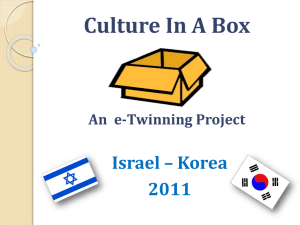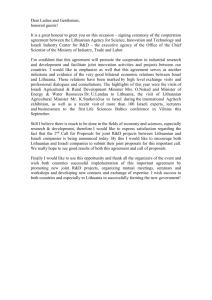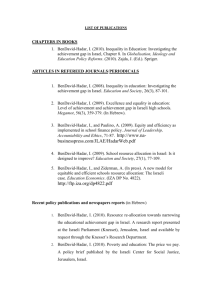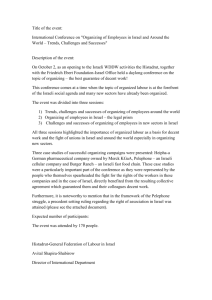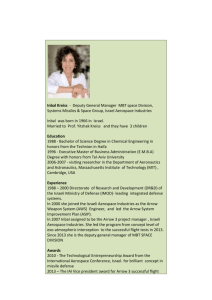Contemporary legal debate in Israel is alive with argument and
advertisement
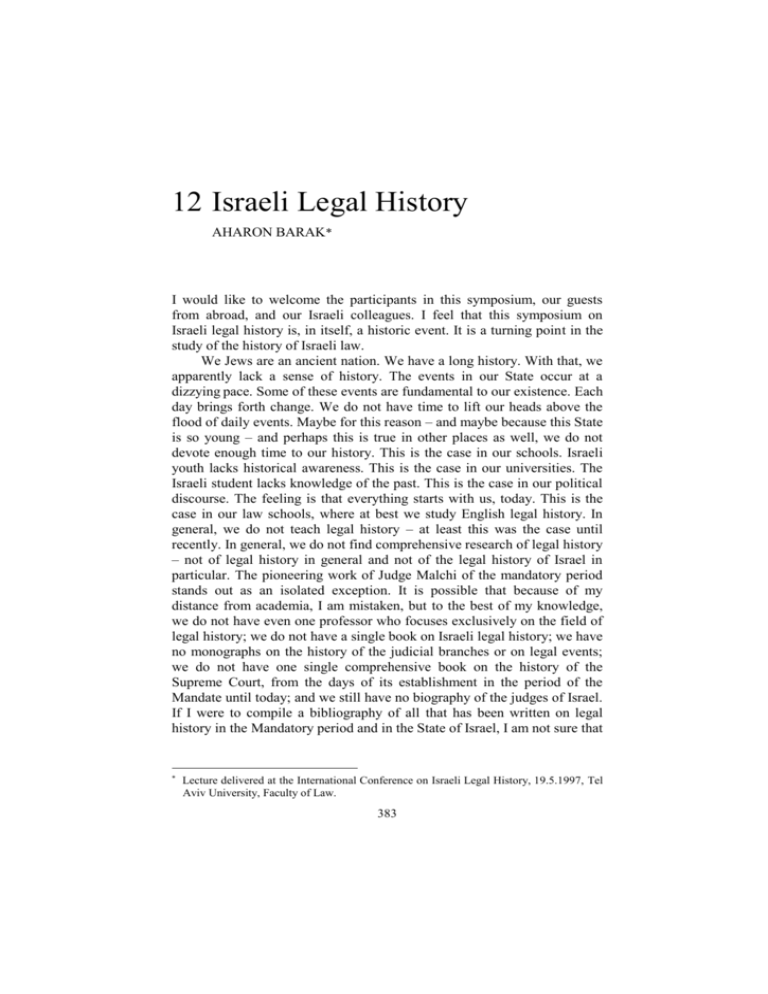
12 Israeli Legal History AHARON BARAK* I would like to welcome the participants in this symposium, our guests from abroad, and our Israeli colleagues. I feel that this symposium on Israeli legal history is, in itself, a historic event. It is a turning point in the study of the history of Israeli law. We Jews are an ancient nation. We have a long history. With that, we apparently lack a sense of history. The events in our State occur at a dizzying pace. Some of these events are fundamental to our existence. Each day brings forth change. We do not have time to lift our heads above the flood of daily events. Maybe for this reason – and maybe because this State is so young – and perhaps this is true in other places as well, we do not devote enough time to our history. This is the case in our schools. Israeli youth lacks historical awareness. This is the case in our universities. The Israeli student lacks knowledge of the past. This is the case in our political discourse. The feeling is that everything starts with us, today. This is the case in our law schools, where at best we study English legal history. In general, we do not teach legal history – at least this was the case until recently. In general, we do not find comprehensive research of legal history – not of legal history in general and not of the legal history of Israel in particular. The pioneering work of Judge Malchi of the mandatory period stands out as an isolated exception. It is possible that because of my distance from academia, I am mistaken, but to the best of my knowledge, we do not have even one professor who focuses exclusively on the field of legal history; we do not have a single book on Israeli legal history; we have no monographs on the history of the judicial branches or on legal events; we do not have one single comprehensive book on the history of the Supreme Court, from the days of its establishment in the period of the Mandate until today; and we still have no biography of the judges of Israel. If I were to compile a bibliography of all that has been written on legal history in the Mandatory period and in the State of Israel, I am not sure that * Lecture delivered at the International Conference on Israeli Legal History, 19.5.1997, Tel Aviv University, Faculty of Law. 383 384 The History of Law in a Multi-Cultural Society it would be more than one or two pages long, double-spaced. We have almost nothing! I read with envy about the extensive work that has been done in the field of legal history in the United States since the 1950s and 1960s. I am also envious of the achievements in this regard in England, in the spirit of Holdsworth, Maitland and Milsom. Indeed, the vast majority of scholarly works in the field of law in Israel are descriptive and analytical. They are anchored in the present, but little has been written on our legal past, and on the connection between the past and the present. Of course there are exceptions. Professor Pnina Lahav is one such exception, but such exceptions are so rare that they are overwhelmed by work fixed in the present. The beacon of hope is the young generation of researchers – those who did their doctorates in legal history abroad and have returned or are returning to Israel. For the most part, they have academic training in both law and history. They want to continue their historical research here. We must encourage them. We must give them the sense that they are doing very important work in researching the legal history of this country, because they are pivotal; because they make history while writing history. I hope that this conference will encourage them. They are not the “stepchildren” of Israeli law. From my perspective, they are the jewels in the crown. Having said that, I ask of them the following: be independent in your work; don’t continue here the arguments that your teachers conduct with their friends in the United States or England. Don’t be another branch of the Harvard School of legal history, or of the Yale School, or of any other English or American schools. The problems of the United States are not the problems of Israel. Don’t look at us only through American eyes; don’t apply here only the American distinctions. Be aware of our uniqueness as a State and as a nation, of our special history, and of the special problems which we have faced and which we will face. Do not weigh Israeli law only according to English and American scales. Of course, view our legal history critically. As in any other field of law, your integrity and intellectual independence is crucial to your work. What should be done? I am not sure that we should create an agenda. Everything that is done will constitute a beginning and all of these beginnings will be important. I am aware of the historiographical arguments regarding the desirable methodology and the desirable way but I suspect Israeli Legal History 385 that we have not yet arrived at that stage. These controversies are the privilege of the wealthy in the field of legal history. The poor have to be thankful for every morsel of writing. Everyone should write within the genre of legal history where he or she is strongest. In time, we will divide into camps and we will criticize one another. Therefore, those who wish to focus on the history of the court – for example, the Jewish Peace Court of the mandate period, on which important work was done by Dr. Ronen Shamir, or the magistrate court in Jerusalem – should do so. Those who wish to focus on an issue – for example, the development of the absorption of English law into Israeli law – should do so. Those who wish to leave the framework of lawyers’ legal history and to find the connection between law and society – should do so. The book by Professor Mautner on The Decline of Formalism and the Rise of Values in Israeli Law, is a good example of this. Let a thousand flowers bloom. Having said that, I would like to raise a few thoughts on some possible roots. 1. 2. It is of great importance to gather data, even basic data. In Israel, we do not have a tradition of accumulating material. It is extremely important to establish criteria to preserve legal data that will be useful to research in legal history. In this regard, we must praise Professor Shachar and his assistants on the achievement of their oral history project. They interviewed the Founding Fathers and Mothers and recorded the conversations. It is unfortunate that this was not done earlier as many of them passed away before their words were recorded. We also have to consider the preservation of material collected by judges. With the retirement of a judge, a large part of his material is destroyed. We lack the culture of preservation of material. We must strengthen awareness in this area. We must examine whether the existing archival tools are sufficient. If necessary, we must change them. Perhaps it is necessary to consider the establishment of a law review on Israeli legal history. In the beginning, it could be published once or twice a year. Over time, and with the accumulation of material, it could be published more often. The journal would emphasize the importance of legal history and would encourage research and writing in this area. It is possible, of course, that it is too early. During this conference, you should examine the possibility. 386 The History of Law in a Multi-Cultural Society 3. 4. 5. As I have noted, we do not have a comprehensive book on the history of the Supreme Court from its foundation in the mandate period until the present. Eliyakim Rubinstein’s book, Judges of the Land, is well known. It covers the period after the establishment of the State. That is a good start. Is there no room for a project similar to the project of the writing of the history of the American Supreme Court under the auspices of the Oliver Wendell Holmes Devise Fund? Perhaps it is too early for this. Clearly, we should not write the history of the present and we must keep a certain distance. But it seems that the history of the Supreme Court in the mandate period is crying out to be written as distinct from other periods. We can also deal today with the history of the Supreme Court between the establishment of the State and the 1960s or 1970s. A special area in legal history is biographies of personalities in the legal field. We are looking forward to the publication of Pnina Lahav’s book on Chief Justice Agranat.1 We must encourage this sort of writing. This field demands study. It is desirable to raise ideas of this sort and to lay the scholarly groundwork. Among us lives Haim Cohn, jurist and philosopher; the quintessential representative of the German aliyah that integrated into the life of the country; a man who went from deep religious faith to complete atheism; an expert in both Jewish and secular law. He served as the State Attorney and Attorney General in the Ben Gurion Government; he was instrumental in the inception of the Ministry of Justice and in the development of legislation from the founding of the State. For many years, he was a justice of the Supreme Court. His biography is the story of aliyah to Israel; of the relations between religious and secular; of power disputes in the young State; of the establishment of the rule of law in Israel; of the position of the Attorney General and of the Supreme Court. Like him, there are many other personalities who deserve scholarly attention – those with us today, for example, Chief Justice Landau and Justice Berinson – and those who have passed away, for example, Chief Justice Smoira, Justice Silberg, Justice Sussman, and many others. In Israel, a number of fields of law have been deeply and widely developed. For example, administrative law, contract law, and tort law. The history of the development in the mandate period and in the early years of the State is extremely interesting. The connection Israeli Legal History 387 between the ‘internal’ development of these subjects and the ‘external’ development of Israeli society as a whole, is compelling. I was happy to learn that Dr. Ron Harris is working in this area. These are important fields for historical research. 6. The Arab issue is difficult and complicated. Their general history has yet to be written fully and comprehensively. Their legal history is almost unexamined. This is a compelling subject crying out to be addressed. it is wide and covers a variety of doctrines. For example, property issues on which Dr. Sandy Kedar is working, and issues of the occupied territories, on which Professor Kretzmer has made a very important start, and many more. These are rich subjects that are awaiting the hand of the legal historian. 7. The problem of church and state in Israel is one of the most complicated in the world. It is related to the core of the definition of Jewish identity. The history of this subject from a legal perspective has yet to be examined. This is the longest history of all. It began before the mandate period, it goes back before even Ottoman rule. It is of course a current issue today, but the disputes of today are an expression of history. And this history, from a legal perspective, is complex and fascinating. 8. The influence of the Ottoman Empire on the mandate period and the Israeli State is a subject of great interest. The influence of the mandate period on the period of the Israeli State is a compelling subject. I am happy that Dr. Assaf Likhovski is working in this field. 9. Research on the development of the history of ideas in Eretz Israel and in the State of Israel is a subject of great importance. Take for example, the idea of democracy, a constitution, the rule of law, and the separation of powers. Each of these and many others have undergone interesting legal developments in Israel. 10. An interesting subject is the Court’s use of history as an interpretive tool for reaching decisions. Israeli courts do this from time to time. The history of the Weimar Republic has been emphasized in the development of freedom of expression and freedom of nondemocratic political parties to participate in the political life of Israel. Legislative history aids interpretation – although not to the extent found in the United States. Are we making advantageous use of history in our judicial work? 388 The History of Law in a Multi-Cultural Society 11. The history of legal education is a subject of great importance. The influence of continental legal education on the shaping of legal education after the establishment of the State; the influence of English legal education, and lately of American legal education. All of these subjects call for legal historical research. Of great interest also is the relationship between the judiciary and academia in Israel; between the law schools themselves, and between the courts and law schools and the Israeli Bar. Every jurist is a historian. Every judge is a historian. Most of us are bad historians. Some of us – and I am among these – are frustrated historians. In Israel, we need professional historians, researchers who know law, researchers who know the tools of historical research. We must have high standards for the research of legal history by researchers who are both excellent historians and outstanding jurists. I had a personal experience that was perplexing. I participated at Camp David.2 I was present at most of the important meetings. I have spent days since then reading the biographies of all of the participants. Each biography presented a different Camp David. And I wonder: how should that history be written? How can the historian navigate his way through the subjectivity of each of the participants? I was a judge at the trial of Demjanjuk. 3 In our judgment, we wrote the history of the Treblinka concentration camp. Many books have been written on this camp. Our criteria were severe and exact. Legal historians don’t use these same severe criteria. But shouldn’t they learn from judges on the objective way to establish facts? For some time, I have thought that an important subject in the history department should be the law of evidence and criminal procedure. In any event, what is needed is good scholarship. In Israel, this scholarship must be developed. In this regard, we should learn from the best of the historians. In this regard, we want to learn from you at this conference. Holmes’ statement that “a page of history is worth a volume of logic” is well known. Unfortunately, we do not have more than a few pages of legal History. We need a change of attitude. We need recognition that legal history is not the ‘step-child’ of the law, but rather, its prodigy. We need to recognize the importance of legal historical research as an independent discipline and as a discipline influenced by society and politics. In this respect, Israel is an excellent workshop for lega1 historical research. On one hand, we are an ancient nation with an ancient history. On the other Israeli Legal History 389 hand, we are a young State with a short legal history. This mixture provides an open pasture for the work of the historian. I hope that this conference will encourage this legal historical research; I hope you will strengthen the awareness of the importance of research in the legal community; I do hope that we will experience a change in our legal culture. Notes 1 2 3 The book has since been published. See Pnina Lahav, Judgment in Jerusalem: Chief Justice Simon Agranat and the Zionist Century (Berkeley: Univ. of California Press, 1997). The peace talks between Israeli Prime Minister Menachem Begin and Egyptian President Anwar Sadat, held at Camp David in September, 1978. Cr.A. 347/88 Demjanjuk v. The State of Israel, 47 (4) P.D. 245 (1993).
